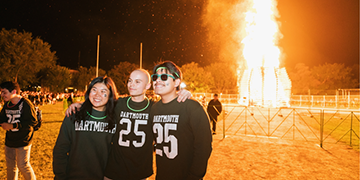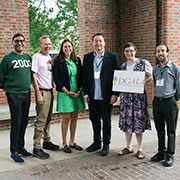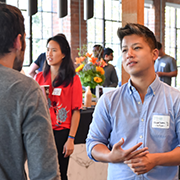The Joy of Globetrotting with Dartmouth
Betsy and Bob Davidson share stories of exploring the world with Dartmouth Alumni Travel.
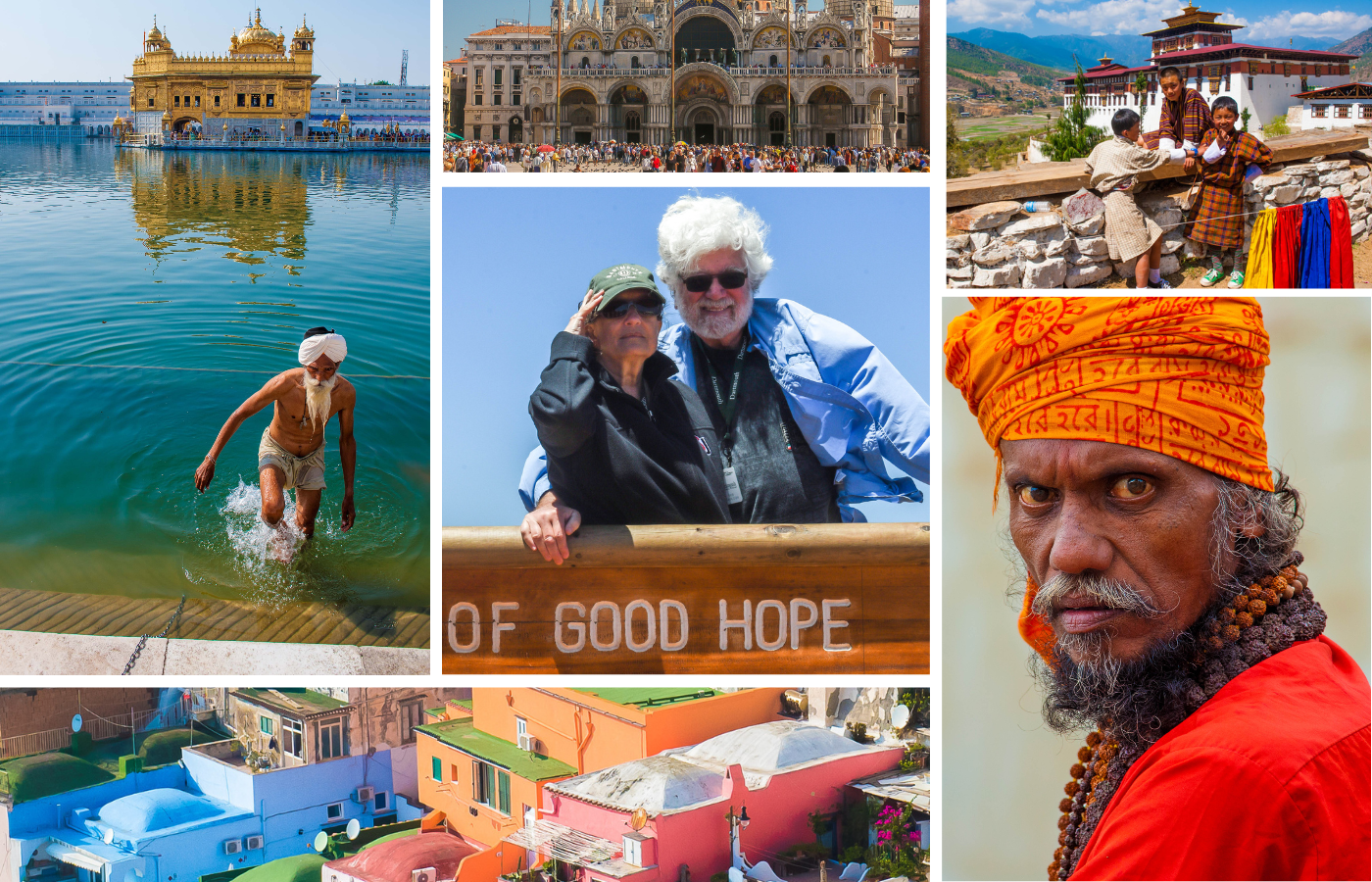
May 12, 2025
7 minute read
James Bressor
7 minute read
Dartmouth Alumni Travel offers the opportunity to see the world on unforgettable journeys guided by faculty who share insights into a destination’s history, current affairs, and culture. Over four decades, thousands of alumni, parents, and friends have traveled with Dartmouth, and nobody has taken advantage of these faculty-led trips more than Betsy and Bob Davidson ’67.
From Iceland to South Africa, Argentina to Uzbekistan to Bhutan, the Davidsons have crisscrossed the globe with Dartmouth. Bob has been on 29 Dartmouth Alumni Travel journeys; Betsy has joined him on 18 trips. These gold and silver medalists of Dartmouth travel have visited every continent except Antarctica—a destination on Bob’s bucket list, not Betsy’s.
Here, Betsy and Bob share why they love to travel and what’s special about Dartmouth Alumni Travel journeys.
Let’s start with the basics: Why do you love to travel, and when did you discover this passion?
Betsy
Bob and I met at Syracuse in graduate school, where I was in a PhD program in South Asian history, which involved a year in India on a fellowship. India got me hooked—experiencing another culture in a bit of depth, enjoying the people, the food, what’s unique, and what’s different. It’s seeing different cultures and meeting different people.
Bob
Like Betsy, I love learning about other people. I’m also into photography and like shooting portraits—sometimes leading to interesting comments about the U.S. Even in places like Vietnam and Iran, people say they admire America as a land of opportunity and liberty, free of the governmental corruption they live with. As for when I got the travel bug, it started while serving in the Navy on the USS John F. Kennedy during the Vietnam War. We had a shakedown cruise in the Caribbean and then had a long cruise in the Mediterranean, where our ports included magical places like Naples, Malta, Genoa, Cannes, Nice, Athens, and Istanbul.
What was your first trip with Dartmouth?
Betsy
Our first was a cruise on the Rhône River in the late ’80s or early ’90s. It was a two-week trip, and the two faculty traveling with us were just wonderful.
Bob
One of them was the eminent historian David Lagomarsino, an expert on the Renaissance in Spain and France, and the other was Nancy Vickers, who later became president of Bryn Mawr. Both were excellent lecturers, and they both spent social time with us.
What’s the level of quality with Dartmouth Alumni Travel, and how does it compare to other travel services?
Bob
Dartmouth offers first-class travel, which you want and expect. They offer lots of options in type of trip and price level. We sometimes travel with other services, but you can’t compare everything apples to apples. You may pay a little more for the Dartmouth faculty who lead the trips. But the faculty are often one of the big attractions of traveling with Dartmouth—you want to go with them again.
So, it’s the faculty who make Dartmouth trips special?
Bob
Absolutely. The level of expertise can vary. We’ve traveled with many faculty who have done a tremendous job. Bruce Nelson was exceptional. When we went to Ireland with Bruce, he recruited local professors to augment his own deep knowledge and passion for the place.
Betsy
We also went on a Baltic cruise featuring Bruce, and he gave a lecture when we were in Poland. Now, Poland wasn’t an area of expertise for Bruce, but he had done extensive research, and he did a wonderful job.
Bob
I think Dartmouth is very selective in choosing faculty to lead trips. The faculty need to have a tolerance for us know-it-alls. When you’re an undergraduate, you’re polite. By the time you get to my age, you’re less inhibited about talking back.
Is there a single moment with a faculty member you remember above all others?
Bob
On a cruise from Venice to Ravenna by way of the Dalmatian Coast, Bob McGrath, a professor of art history, was showing slides of Roman-era mosaics in preparation for our arrival in Ravenna. Bob slowly read the William Butler Yeats poem “Sailing to Byzantium,” which begins, “That is no country for old men.” Bob shared so much historical information throughout that excellent trip, but his sonorous reading of that poem wins the prize for best single performance by a faculty leader during my trips with Dartmouth Alumni Travel.
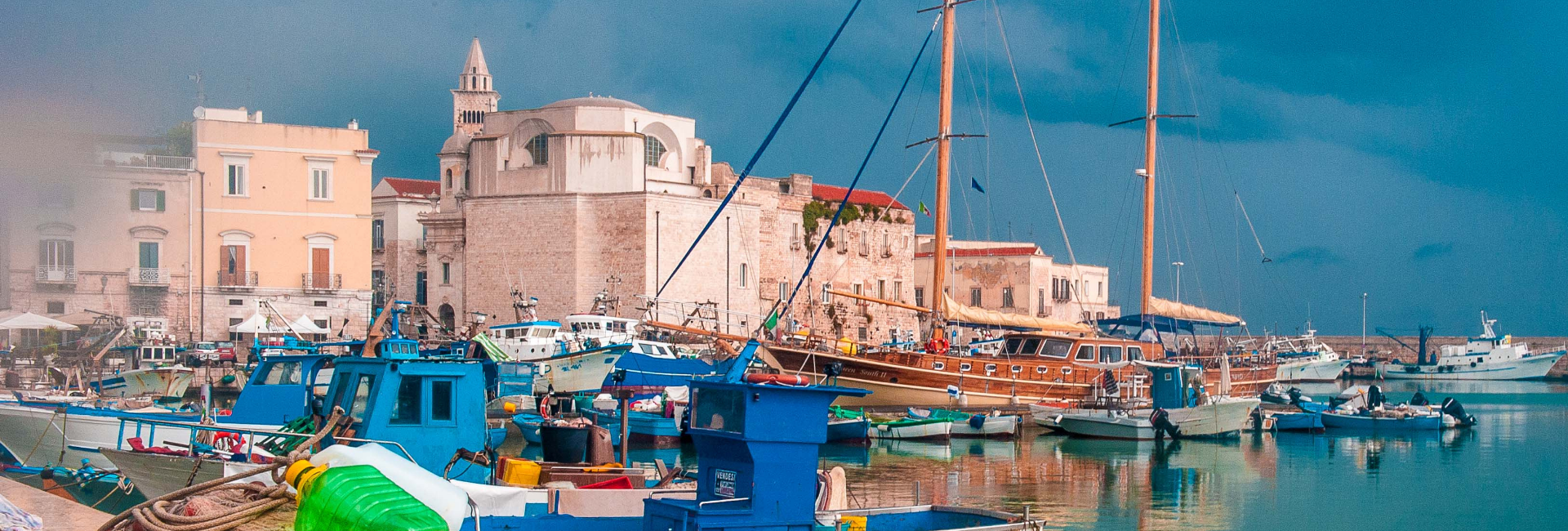
Do you sometimes see unusual places since you’re traveling with an expert?
Bob: On a trip to Myanmar, Dirk Vandewalle, a professor of government who became a good friend of ours, took us to Mount Popa and the Kyaiktiyo Pagoda, pilgrimage sites in the mountains that most tourists don’t visit. Earlier on that trip, Dirk got us up early to ride a horse cart at dawn among the ancient temples of Pagan—a spectacular activity not on the official program.

In all, we have been on five trips with Dirk, and we would love to do more. We’ve also done three trips with Chris MacEvitt in the religion department and two with Mike Mastanduno in government. On a trip to Chile led by the wonderful Latin American historian Marysa Navarro, Marysa arranged a special visit to the office where Salvador Allende had been killed by Pinochet’s troops. As we left the building, our intrepid friend Marysa drew a crowd when she argued loudly in two languages with a local guide who insisted that Allende had taken his own life. Nothing like having your own Dartmouth expert on such occasions!
Which of your Dartmouth journeys stand out?
Betsy
One of our early trips, our first with Dirk, was to Libya, and it’s one of my favorites. We traveled with people from Dartmouth and Columbia, and we had a faculty member from Columbia who was a specialist in the country’s Roman architecture. This was during a brief period when Gaddafi was still in power, but you could visit Libya. We went to huge Roman sites such as Leptis Magna, and we were almost the only people there.
Bob
Well, Southern Africa, China, and Tibet have to be high on the list, but my favorite of all time is Iran. We visited in 2015 when there was a tentative agreement regarding Iran’s nuclear research. Everywhere we went, young people were approaching us right and left to try out their English and talk about America. I was thrilled by the haunting ruins of Persepolis, the capital of ancient Persia burned by Alexander, and we loved learning about Persian history from our expert faculty leader, Gene Garthwaite. The archeological museum in Tehran has to be among the best in the world. We admired the Hammurabi stela and King Cyrus’s “edict of tolerance” engraved in cuneiform on a small cylinder. Our Iranian guide proudly described them as history’s earliest evidence of “respect for human rights” and “rule of law,” which they definitely are. How ironic that they’re so respected in a police state like today’s Iran.

You’ve visited a few countries that many Americans would choose to avoid. Have you ever been concerned about your safety?
Bob
In beautiful Esfahan, near the end of our trip to Iran, we had the opportunity to see something special and not on our schedule—the annual “Death to America Day” parade. I was carrying my heavy Nikon with a long lens. During the block or so walk through the crowd, I decided to cover it up and not try for photos.
Betsy
We recently visited Algeria. It was a boat cruise along the North African coast, with stops at three ports in Algeria, which is just opening up to tourism. There was an armed guard on the bus with us as a precaution. But we never felt uncomfortable.
Do you have time to explore on your own when traveling with Dartmouth?
Bob
You can usually get out and walk on your own. When we visited Vienna, we had a whole day. They took us to a tourist location, and then we were on our own to explore. I kind of got lost in the middle of Vienna, which is a great place to get lost in, especially if you’re a photographer.
Do you always do some research before you travel—to be ready for those free days?
Bob
It’s absolutely recommended to do your own research in advance. It’s designed to be an adventure. Dartmouth sends suggested readings to help you prepare.
Has anything serious gone wrong on one of your Dartmouth trips?
Betsy
Bob had an attack of diverticulitis in Spain and spent nine days in the hospital in Ávila. He didn’t require surgery, but he needed to stay about five days beyond the trip. I continued with the group, recording lectures and taking pictures so I could share them with him later.
Bob
Being there was an educational experience. At this hospital, every patient’s family comes in, eats, and sleeps in the rooms. It’s a social gathering place.
Betsy
And during a trip to China, we were riding a bus in a remote part of Tibet, and the bus got stuck in the middle of a river we were fording. Some local farmers came down and carried us out on their backs.
Bob
If you go on enough trips, something like that is bound to happen.
Is there a dream travel experience that you’re hoping to have?
Bob
I guess I’d say Antarctica, or at least Greenland.
Betsy
Bob may have to do that one on his own.
Ready to plan your next adventure?
Whether you're dreaming of Ghana, the Galápagos, or the Greek Isles, Dartmouth Alumni Travel offers thoughtfully curated journeys led by expert faculty and designed to inspire. Explore our upcoming trips and travel the world with the Dartmouth community.


